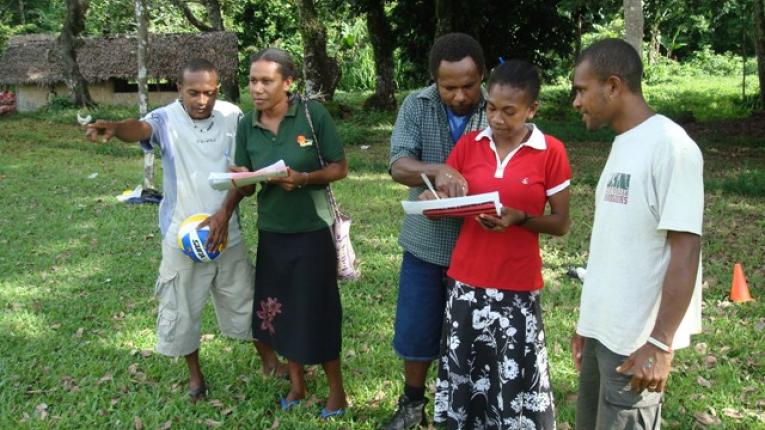The context
Vanuatu is located in the Pacific Ocean, exactly 3,579 km east of Australia. It consists of 83 scattered islands, most of them of volcanic origin, and covers an area of more than 12,000 km². At the last census (2020), the territory had a population of 298,333. According to the World Risk Report 2015, the archipelago is considered the riskiest place in the world to live, as it is highly exposed to the consequences of global warming (cyclones, earthquakes and tsunamis). Its risk index, which also takes into account social, economic and political factors, is 36.72%.
According to the World Health Organisation (WHO) in 2011, almost two-thirds of Ni-Vanuatu (the inhabitants of Vanuatu) are considered overweight and more than 25% are obese. The causes are a sedentary lifestyle and a lifestyle that combines smoking and alcohol. Vanuatu, like other Pacific Island countries, has a growing population of young people, but their health and education remain limited.
The importance of sport in Vanuatu as a means of combating the scourge of obesity is therefore paramount. Although sport is an important leisure activity for children and young people, there are very few sports clubs offering regular sporting activities, particularly in the provinces where there are isolated rural populations, high unemployment rates among young people with no qualifications and unaffordable transport. Very few coaches are trained, so sports competitions are concentrated mainly in the big cities.
In response to this challenge, the Ministry of Youth Development, Sports and Training, the Vanuatu Association of Sports and National Olympic Committee (VASANOC) and the Ministry of Home Affairs launched the 'Nabanga Sport' programme in Port Vila, and in 2008 established the first sports programme specifically for Vanuatu's rural communities: those of Pénama and Taféa.
The project
The Nabanga Sport project aims to promote physical activity through inter-community sporting events, while raising awareness of the health risks associated with a sedentary lifestyle. The programme trains young people from the community to organise sports events for children and teenagers, leading to a sports leader diploma.
To combat exclusion, the project aims to strengthen links within communities through its sports programmes.
In Sanma Province, for example, Nabanga Sport works with Sanma Frangipani, an NGO that promotes full inclusion and equal rights for people with disabilities. As well as giving them the opportunity to play sport, it trains volunteers, both disabled and non-disabled, to organise inclusive sporting activities.
In addition to the sporting activities on offer, such as football, volleyball and athletics, the events must include an education and awareness programme for the youngest members of the community in order to share best practice and develop sporting habits throughout the community.

Implementation
The Australian Sports Commission will provide ongoing strategic and operational support.
The programme is part of the Australian Government's ASOP, which is managed through a collaboration between the CSA and AusAID.
Funding
Australian funding for the 4-year Nabanga Sports Programme is estimated at $1,233,488.
Achievements
Since its inception, Nabanga has achieved fairly satisfactory results:
- Physical activity on Aniwa Island has increased significantly for the majority of islanders aged 15-40.
- The high rate of participation in regular physical activity on Aniwa Island helped to halve the obesity rate between 2009 and 2010.
- Nabanga has also had a direct impact on smoking levels among young men on the island of Aniwa, particularly during the football season when cigarettes are banned during training.
- In Aniwa, the programme has promoted social cohesion on an island suffering from chronic legal and cultural conflict.
- Disabled and non-disabled people are interacting, gaining confidence and changing attitudes and perceptions.
- Parents of disabled children are more aware of their child's abilities and feel more supported by their community in caring for their child.
Le Petit Plus
Nabanga has contributed to social harmony at a time when the island of Aniwa has experienced chronic legal and cultural conflict over access to a lagoon for many years. Until the creation of Nabanga, this long-standing dispute had restricted movement on the island, while the practice of sport has helped to transform social relations on the island.
Sources
• World Risk Report: Food insecurity increases the risk of disaster [online] Available at: https://ehs.unu.edu/media/press-releases/worldriskreport-2015-food-insecurity-increases-the-risk-of-disaster.html#info [Accessed on 03/06/2021]
• Journal de la Société des Océanistes. Family relationships in town are brokbrok: food sharing and contribution in Port-Vila, Vanuatu [online] Available from: https://journals.openedition.org/jso/7745#:~:text=Pourtant%20level%20of%20ch%C3%B4mage,National%20Statistics%20Office%2C%202009).
• https://websites.sportstg.com/assoc_page.cgi?client=2-8136-0-0-0&sID=189603&&news_task=DETAIL&articleID=13198200
This sheet was written by Madga Salvatore, LFC trainee in June 2021.
Last modification : 23 Jan 2024.
Nabanga Sport
Set up by the Department of Youth Development, Sports and Training, the Vanuatu Association of Sports and National Olympic Committee and the Department of Internal Affairs, Nabanga Sport is a programme that aims to encourage physical activity through inter-community sporting events, while raising awareness of the health risks of a sedentary lifestyle.